
Journal of Food and Nutrition Research
Scope & Guideline
Championing Research for Optimal Nutrition and Health
Introduction
Aims and Scopes
- Food Safety and Quality Assessment:
Research focusing on the safety and quality of food products, including microbiological studies, chemical characterization, and the evaluation of food preservation methods. - Nutritional Science and Health Impacts:
Investigations into the nutritional composition of various foods and their effects on human health, including studies on dietary supplements and functional foods. - Food Processing and Technology Innovations:
Development and optimization of food processing techniques, including drying, extraction, and fermentation methods that enhance food quality and nutritional value. - Natural Products and Bioactive Compounds:
Exploration of natural ingredients, their bioactive compounds, and their potential health benefits, including antioxidant and antimicrobial properties. - Consumer Behavior and Food Perception:
Studies examining consumer attitudes towards food products, including food neophobia, sensory evaluations, and market trends.
Trending and Emerging
- Sustainable and Functional Foods:
There is an increasing focus on sustainable food sources and functional foods that offer health benefits beyond basic nutrition, including studies on plant-based alternatives and bioactive compounds. - Use of Advanced Technologies in Food Analysis:
Emerging methodologies such as machine learning, deep learning, and advanced chromatography techniques are being utilized to analyze food components and safety, indicating a trend towards incorporating technology in food research. - Consumer Health and Dietary Trends:
Research exploring consumer health trends, dietary recommendations, and the impact of food choices during crises (such as pandemics) has intensified, reflecting a growing public interest in nutrition and health. - Innovative Food Processing Techniques:
New processing technologies, such as high hydrostatic pressure and supercritical CO2 extraction, are being explored to improve food quality, safety, and nutritional profiles, showcasing a trend towards innovation in food technology.
Declining or Waning
- Traditional Food Preservation Techniques:
Research on conventional methods of food preservation, such as salting and smoking, has seen a decrease in favor of more innovative and technology-driven approaches to food safety and shelf-life extension. - Regional Food Studies:
Studies focusing on specific regional foods and their traditional uses have become less common as the journal shifts towards more global and health-oriented food research. - Basic Nutritional Studies without Health Context:
Papers that focus solely on basic nutritional analysis without connecting findings to health outcomes or broader implications are being published less frequently.
Similar Journals

Annual Review of Food Science and Technology
Transforming Food Science Through Comprehensive ReviewsThe Annual Review of Food Science and Technology, published by ANNUAL REVIEWS, is an esteemed journal dedicated to advancing the knowledge within the field of food science. With an impressive Q1 ranking in the Food Science category, and ranking as #6 out of 389 in the Scopus Agricultural and Biological Sciences category, the journal serves as a vital resource for researchers, professionals, and students. This publication encapsulates comprehensive reviews and cutting-edge research, helping to bridge the gap between research and practical application. Though it does not offer Open Access, it provides valuable insights into various aspects of food science from 2010 to 2024, ensuring that its readership stays at the forefront of emerging trends and innovations. The journal's focus on high-quality, peer-reviewed articles makes it a critical platform for scholars looking to deepen their understanding and contribute to this rapidly evolving field.

Journal of Food Science and Technology-Ukraine
Empowering Food Scientists with Accessible KnowledgeJournal of Food Science and Technology-Ukraine, published by the Odesa National University of Technology, stands as a pivotal platform dedicated to the dissemination of high-quality research in the field of food science and technology. With its open access policy established in 2014, the journal fosters global knowledge sharing and accessibility, enabling researchers, professionals, and students to access critical findings and advancements in food technology without barriers. The journal's commitment to publishing innovative studies, reviews, and case analyses reinforces its role in addressing contemporary challenges in food safety, preservation, processing, and nutritional quality. With ISSN 2073-8684 and E-ISSN 2409-7004, it serves as a valuable resource for the academic community, supporting the advancement of food science knowledge and its practical applications.

CZECH JOURNAL OF FOOD SCIENCES
Pioneering Research for a Sustainable Food FutureCzech Journal of Food Sciences is a premier publication in the field of food science, disseminating vital research since its inception in 1999 and transitioning to Open Access in 2007. Published by the Czech Academy Agricultural Sciences, this journal facilitates the exchange of knowledge among researchers, professionals, and students dedicated to advancing the understanding of food systems, safety, and technology. With an ISSN of 1212-1800 and an E-ISSN of 1805-9317, it holds a respectable position with a Q3 ranking in the Food Science category for 2023, illustrating its commitment to high-quality research despite its Scopus rank of 209 out of 389, situated in the 46th percentile. Located in the heart of the Czech Republic, at TESNOV 17, PRAGUE 117 05, this journal serves as an essential resource for those involved in agricultural and biological sciences, paving the way for innovative discoveries and applications in food science.
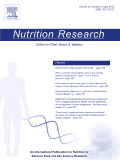
NUTRITION RESEARCH
Connecting Researchers to Shape the Future of NutritionNUTRITION RESEARCH, published by PERGAMON-ELSEVIER SCIENCE LTD, stands as a pivotal platform for the dissemination of groundbreaking research in the fields of nutrition, dietetics, and endocrinology. With an established track record since 1981, the journal has successfully converged its academic purview into 2024, providing a continuous source of high-impact studies that address critical issues in human health and nutrition. Recognized as a Q2 journal in multiple relevant categories, including Endocrinology and Nutrition, as well as boasting respectable Scopus rankings, it serves a diverse audience of researchers, professionals, and students eager to enhance their understanding of nutritional science. Although the journal does not operate on an open access model, its contributions are invaluable, fostering advancements and collaboration within the scientific community dedicated to improving dietary practices and outcomes. The current address of the journal is THE BOULEVARD, LANGFORD LANE, KIDLINGTON, OXFORD OX5 1GB, ENGLAND, positioning it at the heart of global research initiatives.
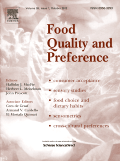
Food Quality and Preference
Elevating Standards in Food Science and Sensory AnalysisFood Quality and Preference is a leading journal in the fields of food science and nutrition, published by ELSEVIER SCI LTD. With a notable impact factor and ranking in the Q1 quartile for both food science and nutrition and dietetics in 2023, this journal consistently publishes high-quality research that explores the multifaceted aspects of food preferences, sensory evaluation, and consumer behavior. The journal provides a critical platform for researchers, professionals, and students engaged in the study of food quality, aiming to enhance our understanding of how sensory properties, nutritional value, and consumer choices intersect. Its commitment to disseminating cutting-edge findings makes it an essential resource for advancing the field and informing practice in both academic and industry settings. Access to the journal is via subscription, allowing for robust engagement with pioneering research that shapes current and future practices in food-related studies.

ITALIAN JOURNAL OF FOOD SCIENCE
Exploring Culinary Innovations and ResearchITALIAN JOURNAL OF FOOD SCIENCE is a distinguished open-access publication dedicated to advancing knowledge in the field of food science, catering to a global audience of researchers, professionals, and students. Published by Codon Publications in Singapore, this journal, operating under the ISSN 1120-1770 and E-ISSN 2239-5687, has been a vital platform for scholarly discourse since its inception in 1996, converging towards a comprehensive view of food science trends through 2024. With an impressive ranking in the third quartile (Q3) of the Food Science category and a Scopus rank of #151 out of 389, the journal plays a significant role in disseminating high-quality research, contributing to a richer understanding of food science within the agricultural and biological sciences. Since transitioning to open access in 2008, it has further expanded its reach, ensuring that innovative research is accessible to all, thereby fostering collaboration and knowledge exchange in this vital industry.

Applied Food Research
Connecting Knowledge to Global Health and Well-BeingApplied Food Research, published by Elsevier, is an esteemed journal that plays a critical role in advancing the field of Food Science. With an ISSN of 2772-5022, the journal has established itself as a premier outlet for high-quality research, achieving a commendable Q1 ranking in the 2023 Food Science category and a 63rd percentile in Scopus rankings for Agricultural and Biological Sciences. Covering a diverse range of topics from food safety to innovative processing techniques, Applied Food Research seeks to publish pioneering studies that enhance our understanding of food systems and contribute to broader discussions on sustainability and nutrition. As it converges on its fourth year of publication, researchers, professionals, and students alike are encouraged to engage with its content through various open access options, ensuring widespread dissemination of knowledge in a field that is vital to global health and well-being. Operating out of Amsterdam, Netherlands, this journal is poised to be an indispensable resource for anyone dedicated to making significant contributions in the domain of food science.
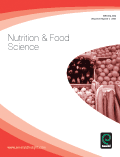
Nutrition & Food Science
Innovating food science for better health outcomes.Nutrition & Food Science, published by EMERALD GROUP PUBLISHING LTD, is a prominent journal dedicated to advancing the understanding of nutritional science and food technology. With an ISSN of 0034-6659 and an E-ISSN of 1758-6917, this journal has provided a platform for scholarly articles, reviews, and insightful research since its inception in 1971. The journal is recognized in the Q3 quartile for both Food Science and Nutrition and Dietetics categories, showcasing its moderate impact within the field. Currently ranked #202 in Food Science and #81 in Nutrition and Dietetics based on Scopus metrics, it caters to a diverse audience of researchers, practitioners, and students eager to explore the latest findings and developments. While not an open-access journal, it offers various subscription options for individuals and institutions keen on accessing high-quality research. With a commitment to interdisciplinary collaboration and practical applications, Nutrition & Food Science is an essential resource for those invested in improving health outcomes through informed dietary practices and food innovations.
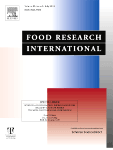
FOOD RESEARCH INTERNATIONAL
Exploring Innovations in Food Safety and QualityFOOD RESEARCH INTERNATIONAL is a premier academic journal published by ELSEVIER, specializing in the field of Food Science. With an impressive impact factor and ranked Q1 in the 2023 category quartiles, it stands at the forefront of research, positioned 17th out of 389 in the Scopus ranking for Agricultural and Biological Sciences, attaining a commendable 95th percentile. The journal publishes high-quality, peer-reviewed articles that cover a broad spectrum of topics, including food safety, quality control, nutrition, and biotechnology, making it an invaluable resource for academics, industry professionals, and students alike. As FOOD RESEARCH INTERNATIONAL seeks to enhance understanding and advance technologies related to food, it encourages innovative perspectives and interdisciplinary research. The journal, active from 1992 and continuing through 2024, is an essential platform for disseminating vital findings and fostering collaboration within the global food science community.
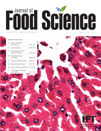
JOURNAL OF FOOD SCIENCE
Pioneering Insights in Culinary Science and TechnologyJOURNAL OF FOOD SCIENCE, published by Wiley, is a premier journal dedicated to advancing the field of food science, bridging the gap between fundamental research and practical application. With an impressive impact factor reflecting its authoritative status, the journal is ranked in the Q1 quartile for Food Science in 2023 and boasts a Scopus ranking of #71 out of 389, placing it in the 81st percentile within Agricultural and Biological Sciences. First launched in 1936, the journal continues to serve as an essential platform for researchers, professionals, and students to disseminate innovative studies and reviews that address critical issues in food quality, safety, and technology. While not currently offering open access, its rigorous peer-review process ensures the dissemination of high-quality and impactful research. Researchers engaged in the vital disciplines of food science will find this journal indispensable for keeping abreast of cutting-edge developments in the field.